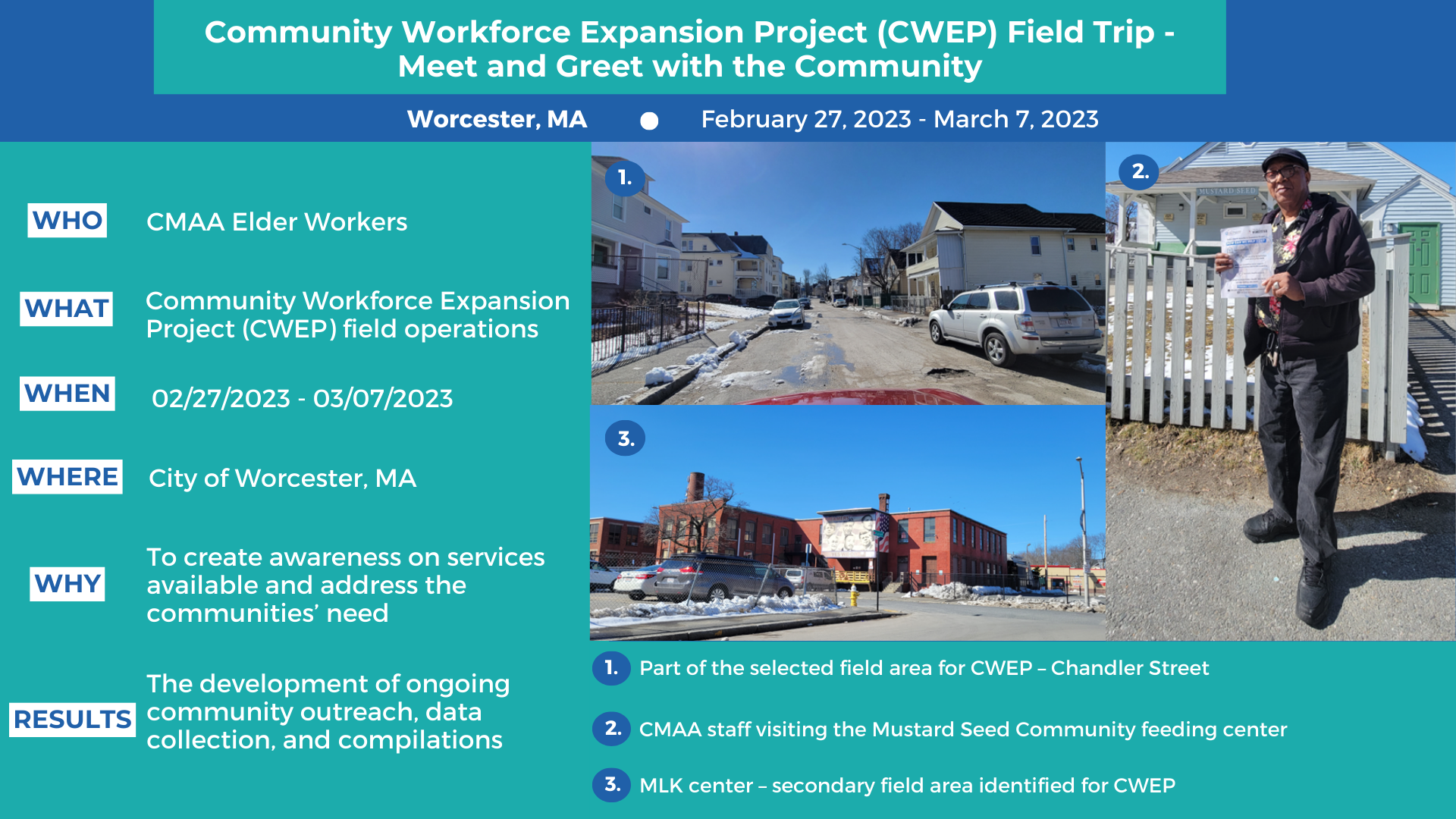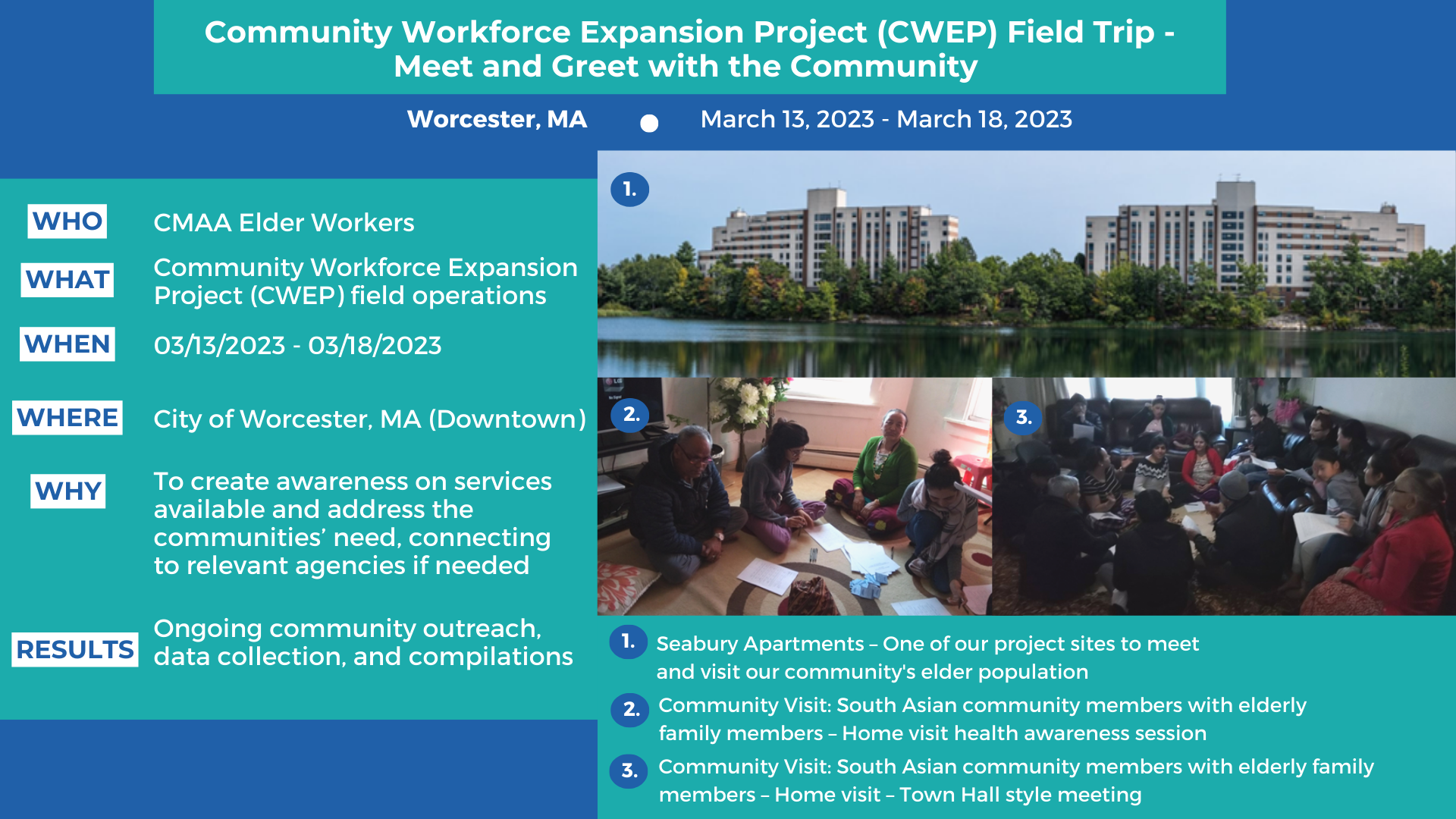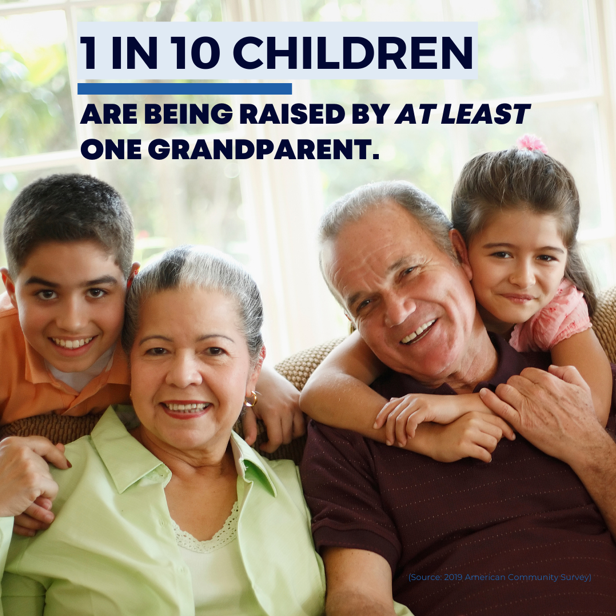BLOG
CMAA Connects: Building Community in Worcester
What does it look like to do outreach to older adults, caregivers, and their families? Let’s dive into what our agency has been up to in a new series called “CMAA Connects.”
Recently, our Community Workforce Expansion Project (CWEP) workers have been doing field trips and in-person outreach across the Worcester area. We’ve focused on building connections in places that have significant elder populations, including Seabury Apartments and Chandler Street. Our goal is to advance outreach capabilities to older adults from all backgrounds and communities in Central Massachusetts, especially for BIPOC elders. The Elder Workers involved with this project are a key part in making this possible and we are lucky to have such wonderful support from our community members.
Here’s a roundup of this month’s incredible work in image form:



Make sure to sign up for our mailing list to get the latest updates. Let’s connect!
Grandparents Raising Grandkids: The Challenges They Face and Where to Find Help

There are 2.5 million grandparents raising grandkids in the U.S. To give some perspective, that’s enough people to fill 263 Polar Park stadiums. In fact, the number of grandparents raising their grandkids in Massachusetts has increased by 30 percent over the last decade (U.S. Census Bureau).
That being said, grandparents raising grandkids is not a new phenomenon and is actually a typical part of many cultures. The recent rise in these multigenerational situations may be due to other factors, though.
One of the reasons more grandparents are taking on this role is due to increases in life expectancy. This not only means that grandparents are more likely to be alive to see their grandkids grow up, but also that they may be needed to help care for them for a longer period of time.
Another reason for the rise in grandparents raising grandkids is the COVID-19 pandemic. With parents feeling the impact of the pandemic physically, emotionally, and professionally, the caregiving role is often split or fully reliant on a grandparent. This leaves grandparents in a difficult situation as they try to adapt to things like online learning and juggling multiple schedules. Older adults may also not be physically or mentally prepared to take on the caregiving role again after raising their own children.
There can be a power struggle between the grandparents and the parents of the grandkids. Grandparents may feel like they know better than the parents, or that they should be the ones making decisions about the children. However, it’s important to try to respect the parents’ wishes and to work together for the best interests of the grandkids. Tensions such as this can grow when things like custody and guardianship come into play, not to mention discussions about covering the cost of raising kids, especially during inflation.
Additionally, many older adults are on fixed incomes and may not have the financial resources to support their grandkids. With most grandparents raising grandkids informally or outside the foster care system, financial support can feel tough to come by. This is especially true for BIPOC elders and communities.
Grandparents may also face a unique situation when their new role is because of their adult child’s struggles. As seen through the opioid epidemic and the rise in mental health issues such as anxiety and depression, grandparents may be raising their grandkids while simultaneously trying to support their adult children. This can put a strain on relationships and have serious impacts on overall community well-being. If one person is struggling, we are all struggling.

So with all these challenges, where can someone find support? Here are some resources to get you started:
The Grandparents Raising Grandkids Resource Center
In December 2022, Congressman Jim McGovern secured $1.2 million to fund the development of a Grandparents Raising Grandkids Resource Center along with hiring six BIPOC community health workers. This effort is aimed at providing culturally competent support for grandparents raising grandkids across the region. This will be led by the Central Massachusetts Agency on Aging, Inc. and will be up and running by May 2023. Call the 508-852-5539 or email info@seniorconnection.org for more information.
Support Groups
There are many support groups for grandparents raising grandkids in Massachusetts offered through the Commission on the Status of Grandparents Raising Grandchildren. Learn more at www.massgrg.com or email Colleen Pitroni, Coordinator for The Commission on the Status of Grandparents Raising Grandchildren at colleen.pritoni@Mass.gov
SNAP benefits
SNAP is administered by the Department of Transitional Assistance (DTA) and dependent on income. SNAP benefits include:
- Monthly funds on an EBT card to buy food
- $40, $60 or $80 a month put back on your EBT card when you use SNAP to buy local produce via the Healthy Incentives Program (HIP)
- SNAP Path to Work offers free education and training opportunities
- Free nutrition education classes
WIC
If your grandchild is under five years old, they are eligible for WIC. This is a nutrition program that provides healthy foods, nutrition education, and other services at no cost. Do you receive WIC? If so, you may be eligible for discounts on other resources. Call 1-800-942-1007 to learn more.
CommunityHelp Navigator
A partnership between Reliant Medical Group and UMass Memorial Health, this online tool helps connect you to local resources and programs by topic. Visit https://communityhelp.auntbertha.com/
Providing equitable resources for grandparents raising grandkids is a key element in strengthening our communities. It’s time to take action and help one another. As Dr. Moses S. Dixon, President & CEO of the Central Massachusetts Agency on Aging says, “there have always been challenges with grandparents who are raising their grandkids. COVID-19 highlighted the need to support grandfamilies in more detail. When that need became evident to us, CMAA stepped up and partnered with some foundations to provide much needed support.”
If you’re a grandparent raising grandkids and looking for some help, the Central Massachusetts Agency on Aging is here. Call 508-852-5539 to get connected to the support you need. You can also visit www.seniorconnection.org and follow us on social media at @cmaaging.
Caregiving for LGBTQIA+ Elders

An image of the LGBTQIA+ Progress Pride Flag
Caregiving can be a challenging, but rewarding process. When it comes to older LGBTQIA+ adults, there are several ways to become a better ally and meet the unique needs of the community:
1. Educate yourself.
Older LGBTQIA+ adults have all been impacted by events including the AIDS epidemic and rise of the LGBTQIA+ rights movement. Spending time learning about such things can give a better understanding about the experiences of LGBTQIA+ elders. There are also many trainings and resources available to learn about different gender and sexual identities as they relate to older adults. Although LGBTQIA+ elders can provide information about their identity, it’s important for you to take learning into your own hands. Relying on the LGBTQIA+ elder you are caring for to educate you on the issues can feel burdensome and frustrating for them. Find reliable sources from reputable organizations that are well versed in LGBTQIA+ topics.
2. Find LGBTQIA+-affirming providers.
It is crucial to find health providers who understand and know how to treat LGBTQIA+ community members, especially elders. There can be a lot of anxiety with this process due to things like previous negative experiences and lack of support from trained providers. As a caregiver, becoming an advocate for the LGBTQIA+ elder in your life means assisting with navigating this search. Resources like the LGBT Resource Guide from the Worcester LGBT Elder Network can be a great place to start. You can also contact your local Agency on Aging for additional paths to take. The GLMA Provider Directory and HRC Healthcare Equality Index can also offer insight on providers knowledgeable about health and LGBTQIA+ older adults.
3. Take time to listen.
Empathy and understanding play key roles in making older adults feel supported, especially those who identify as LGBTQIA+. There can be a lot of things for an older adult to unpack as they navigate their identity and aging. Actively listening to stories and concerns from LGBTQIA+ elders is a great way to know how you can best support their journey. It’s extremely important, however, to respect the conversations you have with who you are caring for. Some people may not feel comfortable coming out publicly or discussing past traumas. Be mindful of this as you care for LGBTQIA+ older adults.
4. Help find ways to connect with the local LGBTQIA+ community.
Social isolation is at an all-time high with the COVID-19 pandemic, especially among older LGBTQIA+ adults. Lack of in person support and interaction can negatively impact a person’s well-being. Luckily, many organizations are working on creative ways to help LGBTQIA+ elders reconnect. Local community groups, like the Worcester LGBT Elder Network and 508 Pride, as well as larger organizations like SAGE are excellent places to start. Additionally, in-person Pride celebrations and gatherings are beginning to re-emerge, creating opportunities for LGBTQIA+ elders to have a sense of community.
There are many factors that go into caring for an LGBTQIA+ elder, but you are not alone. Continuing to increase your understanding of the LGBTQIA+ community is essential to providing the care our older communities need!
Sources:
HIV.gov
American Psychological Association
American Medical Association
Movement Advancement Project
Worcester LGBT Elder Network
SAGEUSA
5 Ways to Recognize Older Americans Month

Source: Administration for Community Living
- Learn about its history.
Older Americans Month began in 1963 when the National Council of Senior Citizens met with John F. Kennedy. They advocated for the needs of older adults, which led to the month of May being designated as “Senior Citizens Month.” The name was ultimately changed to Older Americans Month.Every May, the Administration for Community Living encourages others to honor and acknowledge the contributions of older adults in the United States. It is a time to recognize and support the diverse aging populations of our communities. The theme for 2021 is “Communities of Strength.” - Connect with an older adult in your community.
Senior isolation has been at an all-time high with the challenges and restrictions of the COVID-19 pandemic. As communities, we can work to combat this. There are many ways to safely interact with older adults including phone calls, letters, emails, smaller gatherings. Everyone’s communication style is different, but we all need connection. - Volunteer.Want to give back? Find a local community organization, council on aging, or assisted living facility and see if there are any opportunities to volunteer. Spend your time supporting your neighbors. It makes our communities stronger when people help each other.
- Watch Eldercare 2021.If you’re looking to educate yourself further on issues impacting older adults, check out Eldercare 2021, presented by CMAA and the Worcester County Sheriff’s Office. Eldercare 2021 is a virtual broadcast event which features presentations on topics ranging from elder law to senior mental health. It also has a collection of local resources to help you find answers and information. Click here to watch the program on Youtube.
- Help Worcester become Age-Friendly.We are partnering with local organizations, businesses, and community members to make Worcester a safe, inclusive place for all populations, particularly older adults. Our goal is to have Worcester become officially recognized as an Age-Friendly Community. The Age-Friendly Worcester Initiative focuses on improving things like access to housing, support for caregivers, community engagement, social inclusion, and transportation. We’re looking for community members and organizations who are interested in these efforts, including you! For more information or to get involved, email Ethan Belding at ebelding@seniorconnection.org.
No matter what you do, May is a time to honor and recognize the accomplishments and contributions older adults across the country. To learn more about Older Americans Month, visit the ACL website.
